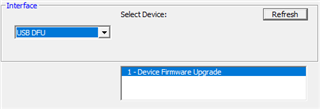Other Parts Discussed in Thread: EK-TM4C123GXL, TM4C1294NCPDT
I am trying to get the steps down for using the DFU. I tried the following:
1. Start with project boot_serial
2. Enable USB update define statements in bl_config.h
3. Build project and flash into EK-TM4C1294XL
4. dfuprog -m switches to dfu mode
5. dfuprog -e displayed only one device in DFU mode
6. dfuprog -I deviceNum -f program.bin -a 0x1800 works both from command line and LM Flash programmer
In the device manager, the Stellaris COM port is not seen any more. What went wrong?
If I try to change the jumper to OTG mode and connect the USB cable to USB port U7, I don't see any COM port either.
I appreciate help getting the correct sequence down. I want to be able to enter and exit DFU mode when needed and also be able to use the Stellaris ICDI when needed.
Thanks,
Priya


